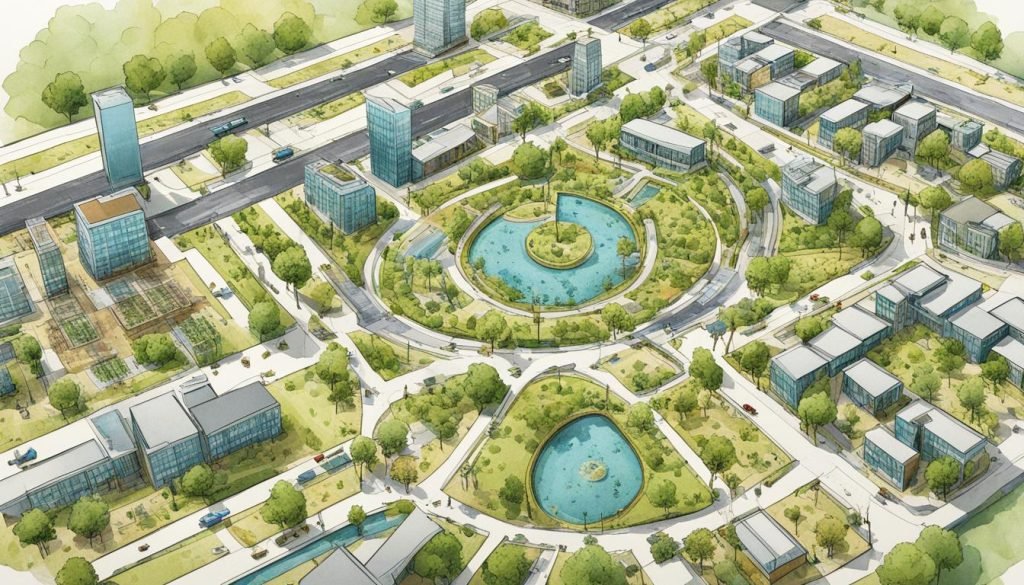Water scarcity is a worldwide issue tied to more people and climate shifts. It’s vital to save water for the future and to lessen environmental harm. This article shows steps to conserve water wisely. We’ll give tips on managing this vital resource correctly.
Key Takeaways:
- Implement sustainable water practices to address global water scarcity.
- Adopt efficient irrigation methods to minimize water usage.
- Manage water resources wisely through eco-friendly water management techniques.
- Explore smart water usage strategies to reduce water consumption.
- Embrace conservation tips for water in daily activities to make a positive impact.
Collecting and Reusing Rainwater for Sustainable Water Management
One great way to support sustainable water use is by collecting rainwater. This method helps save water. You can use less fresh water for things that don’t need to be drinkable, which really helps save water.
Setting up a rain barrel or a rainwater system in your yard is easy. This water is perfect for your garden, washing outside areas, or even for toilets. It cuts down on the amount of drinking water we use every day.
Rainwater harvesting turns wasted water into a useful resource. It helps manage water wisely and saves our important fresh water.
Using rainwater each day means you’re helping the planet. Here are tips for capturing and reusing rainwater:
- Put rain barrels where they can catch a lot of water.
- Make sure to filter out any dirt or other bad stuff from the water.
- Have a plan to move the water to where you need it.
- You might need a pump to move the water around faster.
- Keep your barrels or tanks clean to stop bugs and algae.
Choosing to save and use rain is good for many reasons. It means we use less drinking water and strain less on the city’s water. It helps the earth and cuts your cost on water. So, start saving rain today to help the water situation.
Water Conservation Tips for Every Area of Your Home
Conserving water is key for a sustainable future. There are simple steps we can take at home to save water. Let’s look at how to save water in the bathroom, kitchen, and laundry.
Bathroom Water Conservation
Little changes in the bathroom can save a lot of water. Here’s what you can do:
- Turn off the tap while brushing your teeth or lathering your hands with soap.
- Take shorter showers or think about using a low-flow showerhead.
- Consider a bidet or getting a water-saving toilet.
- Check for leaky faucets and toilets often.
“Bathroom water conservation is about easy habits. Like turning off the tap or fixing leaks.”
Kitchen Water Conservation
Water-saving in the kitchen is important too. Here’s how to cut back in the kitchen:
- Use a dishwasher instead of washing dishes by hand, it uses less water.
- Wait until your dishwasher is full before running it.
- Get water-efficient appliances, like dishwashers and faucets.
These tips will help reduce the kitchen’s water use.
Laundry Water Conservation
Laundry rooms can use a lot of water. Save water with these tips:
- Wear your clothes more than once when you can.
- Always adjust the water level to your laundry’s size.
- Use eco-friendly detergents that need less rinse water.
Simple tweaks in the bathroom, kitchen, and laundry area can save lots of water. By changing our daily routines and choosing water-saving appliances, we help our planet.
Outdoor Water Conservation Techniques for a Greener Landscape
It’s key to save water in your yard for the environment. Good water-saving methods cut down on waste and give you a brighter, greener yard. You should try these ways to keep your garden look great.
- Sweep driveways instead of hosing them off: Cleaning with a hose uses a lot of water. Try sweeping instead. It saves a ton of water and helps our planet.
- Utilize smart irrigation techniques: Smart systems for watering your plants can make a big difference. These devices only water when your plants really need it. They look at the weather and the soil to decide.
- Choose native plants that require less water: Pick plants that are used to your area’s weather. They need less water and can grow strong. This cuts down on how much you have to water them.
- Implement xeriscaping: Xeriscaping is all about smart garden planning to save water. It groups plants by their water needs. Using mulch keeps the ground moist. This beautiful method uses less water.
- Rainwater harvesting for outdoor use: You can gather rainwater for your plants and to clean. Use a rain barrel or a system to collect rain. It lessens how much water you take from the tap.
By using these tips, you make your garden eco-friendlier and save water. You help make the future greener. Plus, you show others they can do the same.
Tips for Conserving Water When Traveling
When you travel, it’s vital to save water and cut down on your environmental impact. You can do this with some simple yet powerful steps. These also encourage others to save water too. Here are some key tips for using less water on your trips:
Choose Sustainable Accommodations
Pick places to stay that care about saving water. This means looking for hotels and resorts that use low-flow fixtures and smart water systems. Your choice supports their water-saving goals.
Reuse Towels
Make an effort to use your towels more than once. Just hang them to dry and tell the staff you don’t need new ones daily. This cuts down on laundry water use and saves a lot of water over time.
Embrace Clothing Reuse
Think about wearing your clothes again, especially if they’re not very dirty. Reusing clothes like this means you don’t need to wash them often, saving water. Plus, it makes your travel bags lighter, which is a win-win.
Utilize Portable Water Filters
Get a portable water filter to always have clean drinking water. These filters can purify water from taps, rivers, or lakes. Then you can use a refillable bottle, cutting back on plastic waste and saving water.
Adding these tips to your travel plans helps everyone save water. Let’s work together for better water management. Remember, using less water is something we can all do!
Understanding the Significance of Water Conservation
Water is precious, playing a key role in life and ecosystems. The world faces water scarcity and a global crisis. So, we must focus on saving water for our future.
The impact of using too much water is huge. It depletes our sources, harms habitats, and pollutes water bodies. By using less water, we help keep our ecosystems in balance.
“Water scarcity is a pressing global issue, affecting millions. Water conservation is extremely vital.” Dr. Jane Robinson, Environmental Scientist
It’s vital to save water to cope with shortages and ensure sustainability. We should fix leaks, use efficient appliances, and smart irrigation. This makes a big and positive impact.
Less water use also means better quality for our rivers and lakes. It reduces the stress on these bodies of water, helping them stay healthy.
Additionally, saving water protects aquatic habitats and the animals that live there. This way, we help keep these ecosystems, found in rivers, lakes, and oceans, alive and thriving.
Water scarcity is a global issue we must tackle together. Knowing why water conservation matters and acting sustainably secures a better future for all of us and the next generations.
Benefits of Water Conservation
Water conservation brings many benefits beyond just solving water scarcity and environmental issues. Some of these benefits are:
- Preserving natural ecosystems and supporting biodiversity
- Reducing energy use and cutting greenhouse gas emissions from water activities
- Saving money by lowering water bills
- Encouraging care for the environment
By adopting water-saving practices, we help create a future that is mindful of water and the planet.
Challenges and Efforts in Water Conservation
Everyone must work together to save water. It is key to dealing with the lack of water and making sure we use water wisely in the future. Yet, making this happen is tough. We need to understand the challenges and what people are doing to save water.
Water Scarcity Challenges
Our planet faces a big problem with not having enough water. There are more people, the climate is changing, and the environment is getting worse. This puts a lot of stress on our water supply. Many people worldwide struggle to find clean water. This endangers their health and life. For Indigenous groups, not getting clean water shows the bigger issue of unfair systems. It also shows the need to protect the rights of these communities to use water as they always have.
Quote: “Water scarcity challenges necessitate systemic changes to ensure equitable access to clean water for all.”
Sustainable Water Management
Taking care of water better is very important. Droughts and floods caused by climate change are making it harder to get water when we need it. We should use water wisely and not waste it. This means using methods like collecting rainwater, watering plants smartly, and reusing water. Doing these things at home or in our communities helps our water systems work better in the long run.
Community Action and Awareness
Making sure we save water is not just up to one person. We need everyone to care and help out. Talking about why saving water is crucial really makes a difference. Encouraging people to use water carefully, starting with schools and workplaces, can save a lot of water. Also, supporting ideas from local groups helps a bunch.
Quote: “Community action plays a vital role in fostering a culture of responsible water usage and conservation.”
Indigenous Water Rights
We should respect and protect water rights for Indigenous peoples. They have ways of managing water that are good for the planet. Protecting their rights and letting them help make decisions is fair and helps everyone. This makes water management better for all of us.
| Water Conservation Efforts | Initiatives and Impact |
|---|---|
| Water conservation campaigns | Raises awareness and educates individuals about water-saving behaviors |
| Water-efficient infrastructure | Investments in water-efficient technologies and systems reduce water usage |
| Policy reforms | Enforcement of regulations and policies that promote water conservation practices |
| Community engagement | Collaborative efforts and community-led initiatives to conserve water |
Together, these actions help us manage water better for a future where everyone has enough.

Embracing Water Conservation for a Sustainable Future
Water conservation is key to a greener future. Simple tips and responsible water use help save this important resource. We must all focus on saving water to have a sustainable and secure future.
Small changes can make a big difference. Turn off the tap when brushing your teeth. Fix leaks as soon as you find them. Use water-saving appliances. These actions help the environment and our communities when we all do them together.
Supporting water-saving efforts is crucial. Cheer on efficient water use, join community projects, and talk about how to use water better. This helps make the world greener. Encourage others to support saving water, too.
Let’s save every drop of water for a better world. Making water conservation part of our daily life matters. It helps protect water, ensuring a sustainable future for us all.





